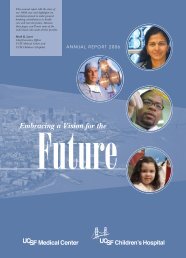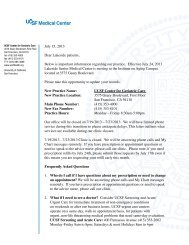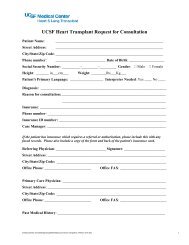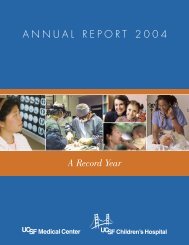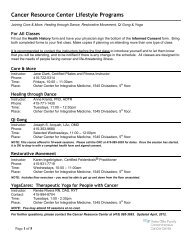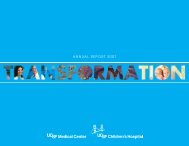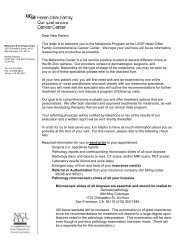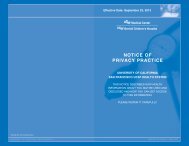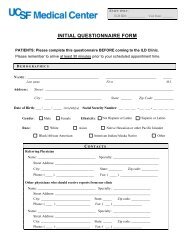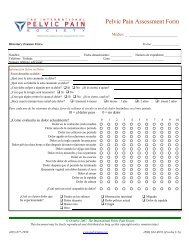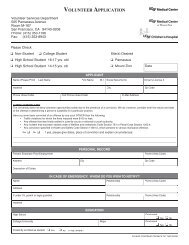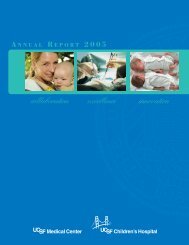c e n t e r n e w s l e t t e r - UCSF Medical Center
c e n t e r n e w s l e t t e r - UCSF Medical Center
c e n t e r n e w s l e t t e r - UCSF Medical Center
You also want an ePaper? Increase the reach of your titles
YUMPU automatically turns print PDFs into web optimized ePapers that Google loves.
DEBORAH HAMOLSKY, RN, MS, AOCNS : ADVANCED PRACTICE NURSE;<br />
ASSISTANT PROFESSOR, DEPARTMENT OF PHYSIOLOGICAL NURSING, <strong>UCSF</strong><br />
Debby Hamolsky has practiced oncology nursing since 1980. A member of the <strong>UCSF</strong> Carol Franc Buck<br />
Breast Care <strong>Center</strong> since 1993, Debby develops programs at the center, provides direct clinical care, and<br />
gives educational and emotional support to women with breast cancer and other breast health concerns.<br />
Over the years, Debby has worked as an inpatient oncology staff nurse, a home-care case manager, a<br />
research assistant for breast-cancer nursing studies, and an oncology and AIDS clinical nurse specialist.<br />
She is also deeply committed to community-based work and advocacy, and has taught special education<br />
in the inner city, provided substance-abuse counseling, worked with adolescents in the juvenile-justice system and<br />
administered a community-based clinic.<br />
Debby has lectured locally and nationally on such topics as breast cancer and breast health, cultural competency in<br />
patient care, sexuality, chemotherapy, grief and bereavement, and pain management. She has also trained Bay Area<br />
community organization volunteers to work effectively with people with cancer.<br />
Debby has received the Jeanne M. Yalon Award for excellence in oncology nursing at <strong>UCSF</strong>. She has written a<br />
chapter on oncology nursing in “Everyone’s Guide to Cancer Treatment,” as well as chapters on breast cancer in an<br />
oncology nursing text. She is currently working with a multidisciplinary group to develop a survivorship program<br />
within the <strong>UCSF</strong> Cancer <strong>Center</strong>.<br />
“Dr. Mary” Whitehill<br />
Everyone needs support when they go through breast cancer treatment, and for Napa veterinarian Mary<br />
Whitehill, that support came in canine form. Her three Labradors, Kona, Holy and Velvet, were by her side<br />
throughout her recovery from cancer surgery. Whitehill, known as “Dr. Mary” at the Napa Small Animal<br />
Hospital, where she is a part owner, was diagnosed with breast cancer in the spring of 2005. She sought a<br />
second opinion at <strong>UCSF</strong>, where an MRI showed a far more invasive cancer than initially supposed. In June<br />
2005 she underwent a mastectomy at <strong>UCSF</strong> with a TRAM Flap reconstruction, followed by three months of<br />
chemotherapy. Her three dogs were there to bolster her spirits during her recovery.<br />
Whitehill said that a nurse who saw a photo of her dogs in her hospital room suggested she might need to<br />
have them stay with friends on her return home, so they wouldn’t jump on her. But Whitehill knew better.<br />
“They were very gentle with me. They always knew when to be quiet—<br />
they’re generally a rowdy bunch—and they lifted my spirits.” She credits<br />
the dogs with getting her out of the house and walking in the vineyard<br />
that borders her home. One dog had to be on a leash, which Whitehill had<br />
trouble gripping, so a friend would join her for walks and take on that job.<br />
Whitehill even kept her usual sleeping arrangements with the trio, using a<br />
long body pillow for a buffer when the dogs piled on her bed at night.<br />
Whitehill, who has nothing but compliments for the <strong>UCSF</strong> team, sees<br />
Dr. Esserman and her nurse practitioner, Suzie Eder, twice a year for<br />
follow-up MRIs and mammograms. She also attends a twice-a-month<br />
breast cancer support group in Napa.<br />
Whitehill claims her bout with breast cancer has helped her take better care<br />
of the patients in her veterinary practice. “Experiencing the level of care and<br />
concern offered by the <strong>UCSF</strong> team made me look at the care I was providing to my patients and their owners,”<br />
she said. “It made me a better vet.”<br />
BREAST CARE CENTER NEWSLETTER • SPRING 2008 • page 9



